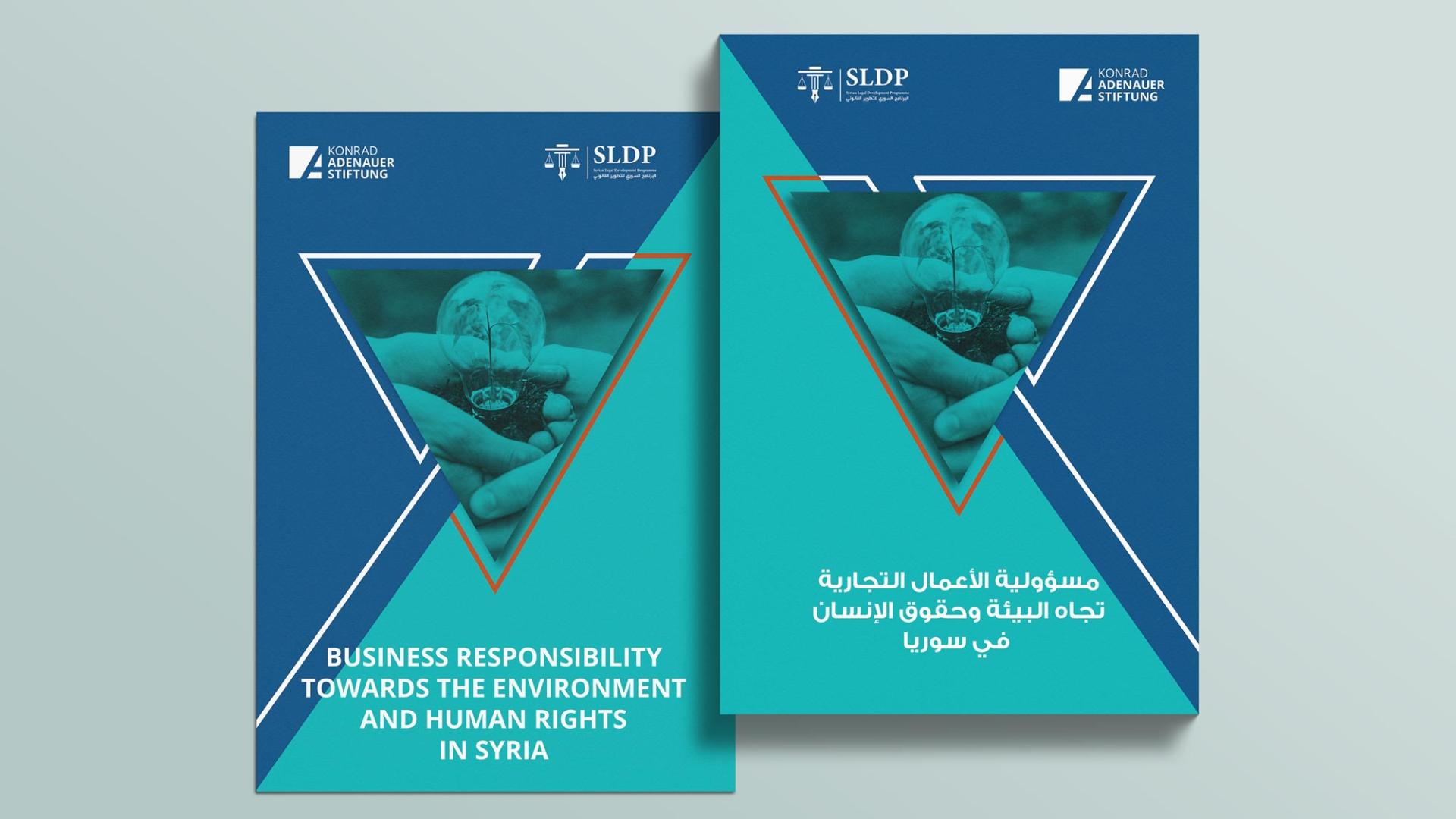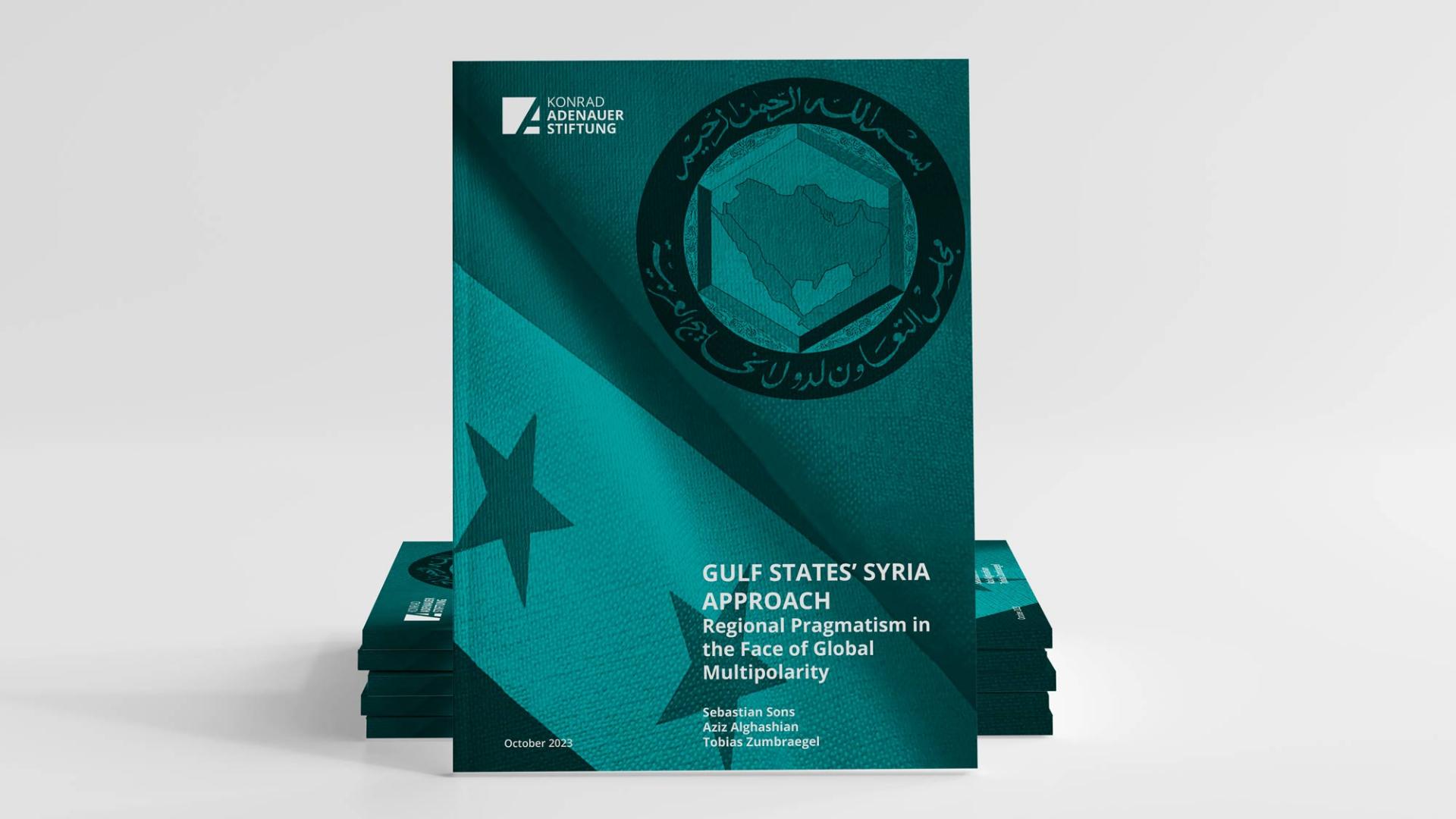Syria, once a cornerstone of the Middle East, has been left in turmoil following the outbreak of civil war in 2011. The nation is now politically and territorially fragmented, with large parts of the country lying in ruins and its economy shattered. Much of the Syrian society is divided and millions have been displaced inside and outside of Syria. Efforts to find lasting solutions toward peace and stability have repeatedly failed and, under the current conditions, it is difficult to envision how a path towards recovery will look like.
Despite — or exactly because of — these challenges, it remains crucial to gain a deepened understanding of the dynamics shaping the country today. These dynamics form a complex web of political, economic and social issues while also remaining deeply embedded in the country’s rich history, culture, and the lived experiences of Syrians, both in the past and present.
Through its work and publications, the Konrad-Adenauer-Stiftung’s (KAS) Lebanon Office, which also works on Syria under its regional mandate for issues of flight and migration, strives to offer different perspectives on these multifaceted issues. KAS aims to inform an interested readership and provide actionable policy recommendations for decision-makers and practitioners working on Syria.
Amongst others, the publications compiled on this webpage cover topics including the impact of the war on Syria’s various ethnic, religious and tribal communities, local governance in its different territories, issues of forced migration and internal displacement, economic and environmental concerns as well as interstate relations and regional issues concerning Syria.
Taken together, the studies offer a comprehensive view of the conflict and its ramifications, not only on Syria and Syrians but also on neighbouring countries and host communities that have been heavily impacted by the Syrian crisis.
Full collection of publications
Epochenbruch in Nahost? Zum Sturz des Assad-Regimes in Syrien
Epochenbruch in Nahost? Zum Sturz des Assad-Regimes in Syrien
Jahrzehntelang bestimmte das Assad-Regime die Geschicke Syriens – und am Ende kollabierte es innerhalb weniger Tage. „Für den Nahen Osten“, so schreibt der Spiegel, „ist das Ende der Assad-Diktatur ein epochales Ereignis“. Warum aber ist der Sturz des syrischen Autokraten potenziell so weitreichend für die gesamte Region? Und wie groß ist das Risiko, dass sich die Dinge in Syrien nicht zum Positiven wandeln, sondern das Land ins völlige Chaos abgleitet oder die eine autoritäre Herrschaft durch die nächste abgelöst wird? Das besprechen wir in dieser Folge mit dem Nahost-Experten Michael Bauer.
podigee
A Window of Opportunity for Syria
After more than 50 years, the rule of the Assad family is coming to an end. This is cause for celebration. But Syria faces huge challenges.
The fall of the Assad regime was as sudden as it was swift. But after more than 13 years of civil war and in view of the complex regional environment, the political reorganisation of Syria is not going to be easy. A heterogeneous alliance of partly jihadist rebels will have to organise the political transition and involve the relevant stakeholders in the process. There is a great sense of optimism in the country, but this is mixed with concerns about revenge and renewed conflict.
The full publication is currently only available in German. To read the full publication, click here.
Ambivalent Loyalty and Dissonance: Alawite Community Dynamics Amidst the Syrian War
How have historical marginalization, political manipulation, and socio-economic challenges reshaped the Alawites’ social identity, political affiliations, and perceptions? An in-depth analysis of the socio-economic and political transformations within the Alawite community in Syria.
Check out the full study here.
Territorial Fragmentation, Violence, and Local Governance in Syria’s Daraa Governorate
This study explores the factors driving violence and instability in Daraa, highlighting challenges in local governance and community resilience amidst ongoing conflict and economic hardship.
Check out the full study here.
Official and Black Market Exchange Rates in Syria, by Karam Shaar
Market Exchange Rates in Syria
This tool tracks the various exchange rates in effect by the Central Bank at any point in time since 2011. It also plots the average black market exchange rate, which Dr. Shaar has been tracking since January 2021, and the rate applicable to the UN as listed on their website. The interactive tool automatically updates once every hour to reflect a timely picture.
Source: Official and Black Market USD to SYP Exchange Rates in Syria | Karam Shaar.
Navigating the Impact of Conflict on Syria’s Ethnic, Religious and Tribal Communities
How has the Syrian war impacted the country’s ethnic, religious and tribal communities and their efforts towards peace formation?
This report answers this question based on five critical case studies while highlighting constraints and opportunities towards localised solutions for peace formation in support of viable policy recommendations.
Check out the full report here.
Special Report: Refugees
A Special Report published by Executive Magazine in collaboration with the Konrad-Adenauer-Stiftung’s Lebanon Office.
Check out the full report here.
Business Responsibility Towards the Environment and Human Rights in Syria
A study conducted by The Syrian Legal Development Programme in collaboration with Konrad-Adenauer-Stiftung, Lebanon Office.
This study dives deep into the overlooked role of businesses, dissecting their environmental footprint and shedding light on the urgent need for sustainable practices.
Check out the full study here.
What happens in Syria?
The Syria dossier of the Konrad-Adenauer-Stiftung in the 2023 winter edition of the zenith magazine.
In a 46-page dossier in the 2023 winter issue of the Middle East magazine zenith, the Konrad-Adenauer-Stiftung sheds light on current developments in Syria. Although from afar, the conflict in Syria appears to be "frozen" and Assad's position in power stable, a closer look reveals that the country and its inhabitants continue to face profound hardships. This dossier goes beyond a superficial analysis and takes an in-depth look at the complex dynamics that significantly influence the situation in and around Syria.
The dossier is only available in German. Please refer to the German page to access the articles.
Gulf States’ Syria Approach: Regional Pragmatism in the Face of Global Multipolarity
This paper analyzes the motivations (or lack thereof) of the Gulf monarchies to normalize relations with Syria. It focuses on underlying regional and international drivers for such a step and further sheds light on the respective Gulf monarchies and their specific positions on Syria.
Check out the full report here.
Regional normalisation – Syrian perspectives
Both the Arab League and Turkey have initiated a process of normalizing ties with the Syrian regime: While the Arab track, led by Saudi Arabia, has received wide international attention and media coverage, in Syria itself the Turkish efforts are monitored much more closely due to Turkey’s active role in Syrian political and security affairs. Yet, as of now, none of the two initiatives have achieved any significant progress, which can mainly be attribute to the Assad regime’s unwillingness to make any concessions. Nonetheless, non-state actors in Northern Syria remain apprehensive. Furthermore, amidst an ever-worsening economic crisis in Syria, unrest and demonstrations are also flawing up in regime-held territories.
The full-length publication is only available in German.
The New Syrian Diaspora: From Basic Survival Struggles to Aspirations of Success and Integration
Against the backdrop of four different country-specific contexts, this report examines the asylum and integration experiences of Syrian refugees in Lebanon, Turkey, Germany and the U.S., shedding light on their challenges as well as societal and economic contributions.
Check out the full report here.
Shattered ground and shattered politics
A devastating earthquake struck Syria on February 6th. While thousands have lost their lives, political opportunism reigned supreme.
The developments that took place in Syria since the earthquake serve as a sad example how political motives frequently prevail over humanitarian ones. Especially the Assad regime has used the disaster to make political gains and strengthen its diplomatic channels.
Check out the full report here.
Syrian-Turkish Rapprochement
In light of recent steps towards rapprochement between Turkey and Syria after more than a decade of animosity, this study explores the consequences and questions related to the normalization of ties between the two countries. What repercussions might a rapprochement have for Syrian citizens, refugees and internally displaced as well as concerned non-state actors and foreign players? And how will it impact the overall humanitarian, economic and political situation in Syria?
Check out the full study here.














